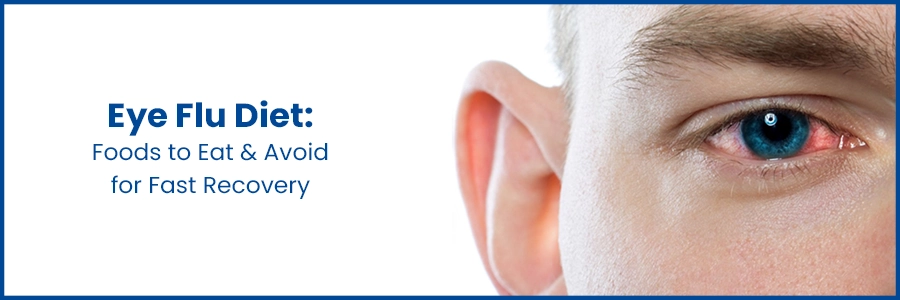Eye Flu Diet: Foods to Eat for Fast Recovery

Eye flu, also known as conjunctivitis, is a common condition characterized by red, itchy, and inflamed eyes. While it is usually not serious, proper nutrition can play a significant role in promoting fast recovery and easing discomfort during this period. In this comprehensive guide, we will explore an eye flu diet, highlighting foods to include and avoid for a speedy and comfortable recovery.
Eye Flu Diet: Foods to Eat for Fast Recovery
- Vitamin A-Rich Foods Maintaining eye health relies on the essential role of Vitamin A. and promoting tissue repair. Incorporate vitamin A-rich foods like carrots into your diet. Sweet potatoes, spinach, kale, and apricots in your diet. These foods can help alleviate eye discomfort and support the healing process.
- Omega-3 Fatty Acids Omega-3 fatty acids are endowed with anti-inflammatory attributes that aid in diminishing eye inflammation and discomfort during eye flu. Integrate sources such as fatty fish ((such as salmon, mackerel, and sardines), along with chia seeds, flaxseeds, and walnuts. into your dietary regimen.
- Citrus Fruits Citrus fruits like oranges, grapefruits, and lemons are excellent sources of vitamin C. This essential nutrient can strengthen the immune system, which aids in faster recovery from eye flu.
- Green Leafy Vegetables Abundant in antioxidants like lutein and zeaxanthin, green leafy vegetables foster eye health. Spinach, kale, and collard greens possess the potential to alleviate eye inflammation and provide relief from discomfort.
- Herbal Teaz Herbal teas like chamomile, rooibos, and calendula have anti-inflammatory and soothing properties that can provide relief to inflamed eyes. Sip on these teas throughout the day to ease eye discomfort.
- Berries Berries like blueberries, strawberries, and raspberries contain antioxidants that support overall eye health. These delicious fruits can also help reduce eye inflammation and promote healing.
Foods to Avoid during Eye Flu
- Salty Foods An excessive intake of salt can result in water retention, leading to... may cause puffiness around the eyes and worsen eye discomfort. Avoid salty snacks and processed foods during eye flu.
- Spicy Foods Spicy foods may irritate the eyes and exacerbate eye flu symptoms. Opt for milder flavors and avoid hot spices during this period.
- Processed and Fried Foods: Their Impact Processed and fried foods frequently contain elevated levels of unhealthy fats and are deficient in vital nutrients. Consuming such foods can weaken your immune system and impede the recovery process.
- Caffeinated and Alcoholic Beverages Caffeine and alcohol can lead to dehydration, which may worsen eye discomfort. Instead, focus on hydrating beverages like water, herbal teas, and fresh fruit juices.
Conclusion:
A well-balanced eye flu diet can help ease discomfort and promote fast recovery from conjunctivitis. Including nutrient-rich foods like vitamin A-rich vegetables, omega-3 fatty acids, citrus fruits, and green leafy vegetables can support eye health and healing. Additionally, avoiding salty, spicy, processed, and fried foods can prevent exacerbation of symptoms. However, it's essential to remember that an eye flu diet should complement medical treatment, not replace it. Always consult with an eye care professional for proper diagnosis and personalized advice on managing eye flu symptoms.
